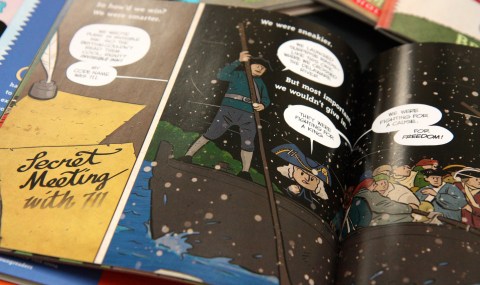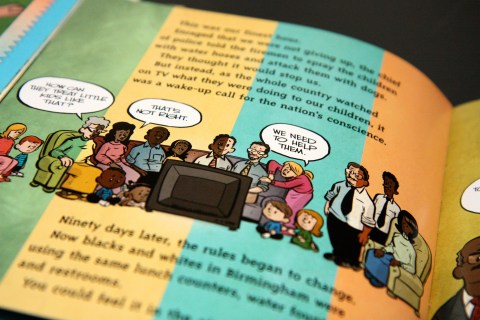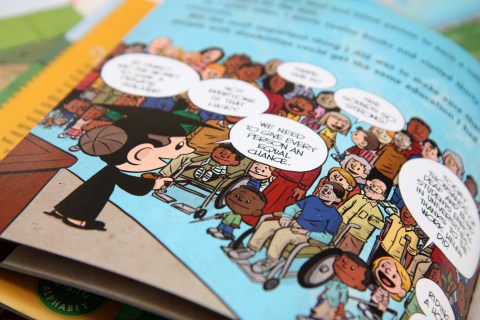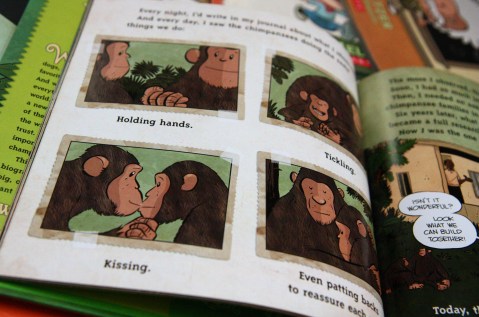Introducing Activism to Children
November 17, 2016 § 11 Comments
 In light of last week’s election results, I am struggling, like so many millions of Americans, with the question of what I can and should do to combat the rhetoric of hate and intolerance that has prevailed in this unfathomable reality, where someone running on a platform of racism, misogyny, and xenophobia would be awarded the highest position of power in our country.
In light of last week’s election results, I am struggling, like so many millions of Americans, with the question of what I can and should do to combat the rhetoric of hate and intolerance that has prevailed in this unfathomable reality, where someone running on a platform of racism, misogyny, and xenophobia would be awarded the highest position of power in our country.
What do we do now? Specifically, how do we advocate—and inspire our children to advocate—on behalf of those who are afraid, of those who are on the receiving end of vitriolic slurs and physical threats, of those whose place in our communities is suddenly threatened?
In the first 48 hours following the shocking results, I was unable to turn away from the news, inhaling every editorial or opinion piece that I could find—as if, taken together, all those words could fill the chasm that I felt breaking open inside me. Two common refrains did provide some element of sense-making—at the very least, something I could echo to my children: one, that many of the people who voted for our president-elect do not support his hateful rhetoric but did so because they or their communities are hurting in very real ways; and two, that with a country so vehemently divided, we have to start listening to one another if we are going to find a productive and peaceful way forward.
Eventually, though, the news just made my head hurt more. (I then went through a period of emotional eating, but we’ll leave that out…plus, it hasn’t completely ended and, come to think of it, I think I’m getting low on peanut butter ice cream…)
Ultimately, though—as has been true so many times in my life—it is books that are serving as my therapy, books that are giving me hope. In my alone time in the car, I am listening to Sissy Spacek’s beautiful recording of To Kill a Mockingbird and taking heart in everything that comes out of the mouth of Atticus Finch. Immediately following the election, I read to the kids Debbie Levy’s new picture book biography, I Dissent: Ruth Bader Ginsburg Makes Her Mark, mostly so I could reassure myself that there are still people in power fighting for decency and justice. Then, over the weekend, the kids and I cozied up and rejoiced in Ratpunzel, the latest in the deliciously feminist “Hamster Princess” series, because, well, escapist therapy feels pretty great right now.
But the most fortuitous book-related turn of events came when the kids and I stumbled upon a collection of books about the very heroes from our past who can inspire us to stand up in our future. These are true stories that address many of the very prejudices and injustices that I believed were mired in our country’s past, but which I am now painfully aware were not all that deeply buried after all.
As kismet would have it, last week’s election was immediately followed by the arrival of our Scholastic mail-order books, which my kids have been eagerly anticipating ever since they turned in their orders at school a few weeks ago (the newsprint circulars from Scholastic are another thing that has not changed in this country).
I had been pleasantly surprised when my six year old originally picked out a “starter set” of five titles in Brad Meltzer’s “Ordinary People Change the World” series, seeing as she has shown zero interest in biographies to date (or, if I’m being honest, in most non-fiction). Of course, she’s exactly the reader that Meltzer intended to target when he decided to introduce historical figures through conversation, cartoons, and a child-centric view of the world, in such titles as I am Abraham Lincoln, I am Rosa Parks, I am Albert Einstein, I am Jackie Robinson, and I am Amelia Earhart. (In less than a week, we have since added I am Jane Goodall, I am Martin Luther King Jr., I am George Washington, and I am Helen Keller to our collection. And I am Lucille Ball and I am Jim Henson are on our list.)
If I was originally surprised by my daughter’s selection, I am even more surprised that, in the days following our initial reading of the first five books, my daughter has carried them everywhere. She reads them in the bathroom. She reads them at night by flashlight. And, since she can’t actually read, she asks me to read them aloud to her again and again.
I am even more surprised that my third grader has stopped what he’s doing—every single time—to look over our shoulders as we read them. As if he too can’t get enough. He even took three to bed with him last night.
I am even more surprised by how animated and excited I become while reading these books, as if optimism—and not outrage or heartbreak—is raining down upon us for a few precious minutes.
I am even more surprised that I’m saying this about these particular books. Because I have, admittedly, been slow to get on the bandwagon of Brad Meltzer’s popular series, which launched almost three years ago. There’s much about Christopher Eliopoulus’ illustrations—the oversized heads, the gaping black mouths, the blunt backgrounds—that I initially mistook for crude (the adult-in-a-kid’s-body still kind of freaks me out). I preferred reading about Einstein through the sublime art of On a Beam of Light, or Lincoln through the abstract palette of Looking for Lincoln. But, of course, my six year old doesn’t.
So, while I’ve recommended the “Ordinary People Change the World” series to schools, even brought them into my kids’ classrooms from the library, I never really saw them as worthy to own. Of course, I hadn’t ever sat down and read one cover to cover. Until now.
Now, I get it. Because Meltzer’s writing is utterly captivating. The choice to write in the first person is unique (“It’s like I’m hearing their real voices, Mommy!”), and the choice to directly address the child reader makes it impossible to look away.
Each book is a living and breathing example of what it looks like to stand up for what you believe, to stand up for what you love, to stand up for what is right. Each book showcases obstacles that had to be overcome, nay-sayers that had to be denied, and courage that had to be summoned. Each book demonstrates the way in which determination, combined with hard work, a hefty dose of creativity, and serious guts, fuels ordinary people to make the extraordinary happen.
It turns out that Eliopoulus’ blend of cartoons and comics perfectly complements the tone of the narrative, heightening the indignance of the voices, the unfairness of the situations, and the celebration of expectations overturned. As a bonus, his pictures lend humor to many of the pages (and if there’s one thing that will get my youngest interested in history, it’s humor).
When Rosa Parks talks about how she used to wonder if rainbows would come out of the “colored” drinking fountains—the ones that were outside and around the building from the “white only” fountains—we want to reach through the page and hold her little hand.

When the character of Jackie Robinson confides to the child reader about bravery, we lean in to listen. Jackie was not by most definitions a brave kid: “In fact, as a kid, I didn’t like sleeping alone. I used to sleep in my mom’s bed. Even when she tried to bribe me, I wouldn’t leave.” And yet, years later, his passion for baseball—and for winning at baseball—led him to persevere against all odds, despite pitchers throwing fastballs at his head and catchers spitting on his shoes and letters that threatened to hurt his family.
These books are much more sophisticated than I presumed at first glance—scintillating for a kindergartener, yet still plenty meaty at 30-40 pages for a third and fourth grader. Neither do they shy away from hard truths. In I am Abraham Lincoln, Lincoln watches as a boat sails down the Ohio river carrying slaves chained to one another (“I didn’t do anything that day, but for years, the memory of those people…it haunted me.”).
In I am Martin Luther King Jr., many of the nonviolent protests of the Civil Rights Movement—and the violent reactions they sometimes spurred—are vividly brought to life, including the Children’s Crusade (“The chief of police told the firemen to spray the children with water hoses and attack them with dogs.”).
Defiance comes in many forms. Both my kids were fascinated to learn that General George Washington used invisible ink and code names to draw up plans that the British couldn’t read (“How’d we win? We were smarter. We were sneakier. We were fighting for a cause. For freedom!”).

Helen Keller, mocked for her “dumbness” and initially told she couldn’t attend college—even after she had taught herself to speak—went on to fight for the access of public universities for all people, regardless of disabilities. Because activism breeds activism, she also went on to become a suffragist, an early advocate for free speech, and a fighter for equal rights for black Americans. And she did so by making sure that she met with every president from Grover Cleveland to Lyndon Johnson (“But let’s be honest. They met her.”)
Jane Goodall’s love for the planet and the animals with whom we share that planet feels especially poignant right now; and the undeniable cuteness of the chimps in I am Jane Goodall doesn’t hurt. (“Listen to the feelings in your heart. We are responsible for the animals around us. We must take care of them. When one of us is in trouble—be it human, creature, or nature itself—we must reach out and help.”)
It’s hard to say how much my daughter understands about this presidential election and its ramifications. Probably not a whole lot. In the 48 hours that followed, while her older brother was busy listing off organizations that we should give money to and describing signs he wants to make for the yard (Peace for All), Emily just kept asking, “Can’t they have a do-over?”
But I wonder if, perhaps on some subconscious level, she was drawn to these books because they carry with them a note of hope in a time that feels dangerously close to listing toward hopelessness. Children don’t have to understand the particulars about our government to pick up on the uncertainty and uneasiness that exists in the air right now. These books reassure us of the greatness in our country and across the world, of the resiliency of mankind, and of the potential for one person to make a difference.
Each of Meltzer’s biographies closes with a call to action, an encouragement to stand up in the name of human dignity. One of the most fitting passages, given our current social climate, comes out of the mouth of Rosa Parks (via Brad Meltzer).
In my life, people tried to knock me down.
Tried to make me feel less than I was. They teased
me for being small. Being black. Being different.
Let me be clear: No one should be able to do that.
But if they try, you must stand strong.
Stand for what’s right.
Stand up for yourself (even if it means sitting down).
Brad Meltzer needs to write a whole lot more of these books—and FAST. I hope to see an even greater diversity of races, religions, and sexual orientations represented in the people he decides to profile. I promise you, we are going to read every single one. Multiple times.
If I can encourage my children to bear witness to these acts of dismissal, hate, and bigotry on paper, then hopefully they will spot them in real life, too. If the language for talking about these acts already exists in their lexicon, then hopefully they will not shy away from speaking out, not only when the time is right, but every time it’s right.
In To Kill a Mockingbird, Atticus Finch tells his daughter, “You never really understand a person until you consider things from his point of view…Until you climb inside of his skin and walk around in it.”
With these small books, our children (and us) have an opportunity to climb inside different slices of history, to witness how activism can take a multitude of brave and peaceful forms, and to perhaps even feel some of the bewilderment, outrage, thoughtfulness, and determination of ordinary people who spoke up and acted out to change the world.
—
Did you enjoy this post? Make sure you don’t miss any others! Enter your email on the right hand side of my homepage, and you’ll receive a new post in your inbox each week.
All opinions are my own. Amazon.com affiliate links support my book-buying habit and contribute to my being able to share more great books with you–although I prefer that we all shop local when we can!





Such an important and beautifully articulated post. Sounds like an amazing book collection – a “must have” for our family.
A MUST indeed! Thank you, Christen. 🙂
Melissa,
Thank you for your heartfelt post. I, too, have been struggling with the election results. It’s been such a hard week, but I finally realized I could best help by continuing to share about kids’ books that make a difference,such as you are. I wasn’t really aware of Brad Meltzer’s books, and I’m so happy to learn about them. I loved your descriptions of your kids taking the books to bed and how they have really made a connection to the heroes! Thanks for sharing your story.
Susan
Thank you for your comment and for your continued commitment to putting great books into kids’ hands. We can make such a difference with what we share with our children. 🙂
These books sound perfect for me to bring to the school where I began as a Reading Tutor today. Mark, Conner, Aavon and Gregory will enjoy going through them. I can’t believe how easy and comfortable it was to share books with 2nd Graders. They wowed me with their intensity and humor. I look forward to meeting with them each week. What a great thing to do with kids in your frr time.
Nonno Pat
F. Patrick La Salle Design/Graphics 225 Sheridan Street Rockford, Illinois 61103 USA 815.963.2089 cell 815.218.4742 fpatlasal@aol.com
It’s wonderful that you are volunteering in this way! Those kids are lucky to have you!
I will definitely check those out. Reminds me of my favorite kids’ biography series: Value Tales which are also about these themes (and which you can still get on ebay).
Someone else recently mentioned Value Tales to me. I wonder why I never read them as a kid. Perhaps because, much like my daughter, I thought I hated biographies. 🙂 Glad to have an excuse to make up for lost time now! Best to you and your family.
Thank you, Melissa. I have been so deeply sad about the state of the world that cute animal videos are the extent of my internet usage lately. Had to change the homepage from the NYT to the Pandacam. Guess I’m still in the denial phase. Your well chosen words reminded me that others are also struggling and that books may well save us all in the end. Hang in there—hope that the peanut butter ice cream situation has been remedied!
Perhaps I should work on replacing the peanut butter ice cream with cute animal videos…that sounds healthier. 🙂 “Books will save us all in the end” is exactly what I’m banking on. Thanks, Page, and big hugs to you and yours.
[…] hugely popular “Ordinary People Change the World” graphic biography series, many of which—as I discussed in the wake of the 2016 election—have become especially near and dear to my daughter’s heart. (When Emily’s school had […]